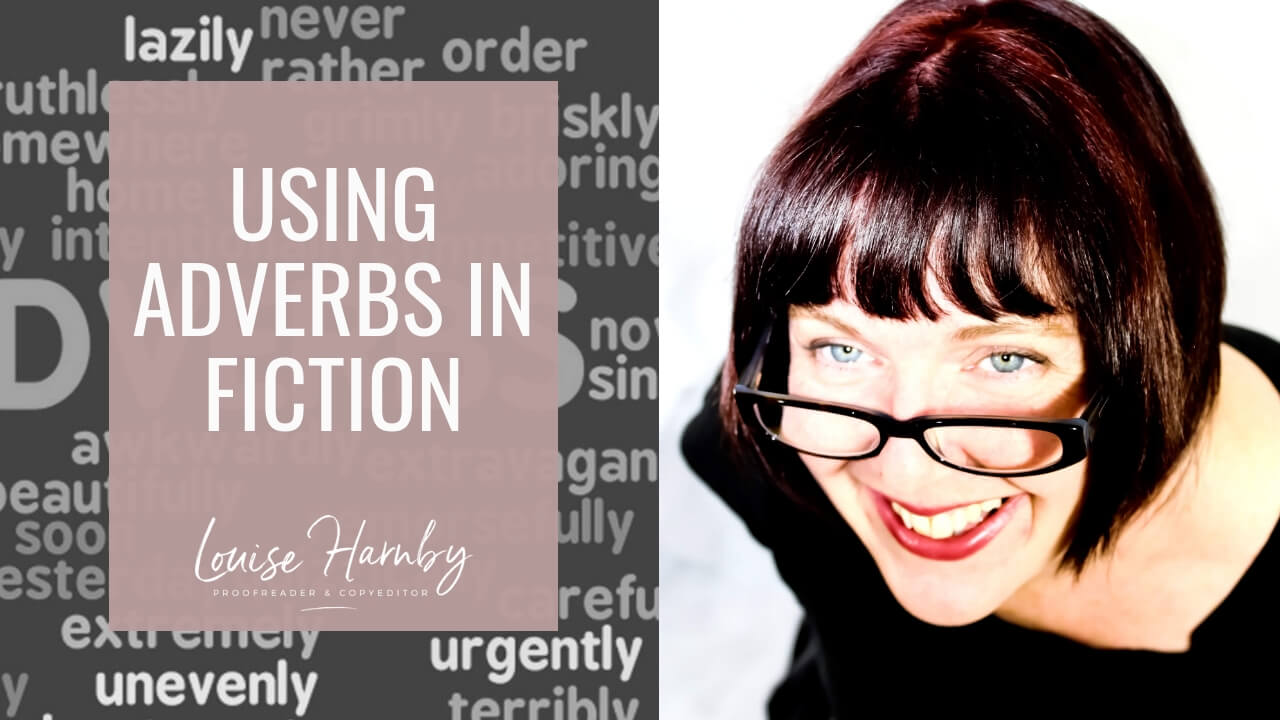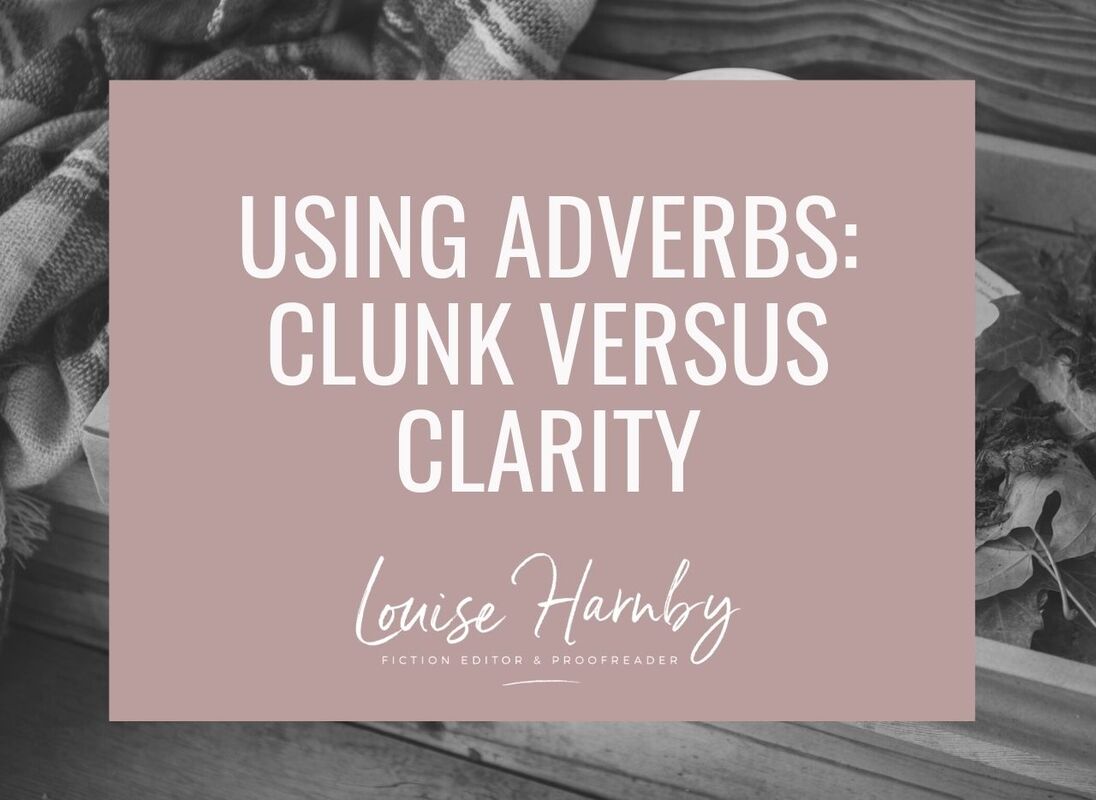|
Adverbs and adverbial phrases sometimes get a bit of a pummelling, and yet they needn’t intrude and shouldn’t be removed indiscriminately. An adverb is no more likely to spoil a sentence than a poorly chosen adjective or noun.
Use them purposefully in your writing when they bring clarity, but remove them when they create clunk.
Are there rules? You won’t find any in this article, just common-sense guidance to help beginner writers make informed decisions.
The fiction writer – and the fiction editor – who takes a formulaic approach to the treatment of adverbs is heading for trouble. A note on form Not all adverbs end in –ly (e.g. backwards, inside) and not all words ending in –ly are adverbs (e.g. deadly is an adjective and anomaly is a noun). That’s one good reason not to eradicate all –ly words from your writing. To work out whether a word or phrase is behaving adverbially, focus on what it’s modifying not on how it’s spelled. Verb and adverbs – a quick refresher A verb is a doing word; it describes a physical or mental action or state of being.
An adverb is a word that describes a verb (just as an adjective describes a noun).
An adverbial phrase behaves in the same way but uses two or more words to describe the verb (or verb phrase).
Clunk: Telling us what we already know from dialogue Here are four examples where the adverb (in bold) attached to the speech tag is redundant because the information in the dialogue does the same job:
These aren’t rules but guidelines. Test it. Remove the adverb and read the sentence aloud. Is the intention still clear from the dialogue you’ve written? If so, great – you can lose the adverb. If it’s not, can you recast the dialogue? Consider the following:
In (1), dialogue and supporting speech tag seem a little flat. In (2), the adverb helps us to understand John’s mood. In (3), we lose the adverb but the mood intention is supplied by the additional dialogue. In (4), the adverb repeats the mood intention. None of above four examples is grammatically incorrect, but (1) is possibly underwritten and (4) is definitely overwritten. Context is everything though. If you’re writing a high-octane crime-thriller scene in which the pace is fast and furious, (1) might just be perfect, (2) and (3) would slow the reader down, and (4) would still be a non-starter. Clunk: Telling us what we already know from the speech tag Here are three examples where the adverb (in bold) is redundant because the verb (in italic) provides the same information:
Beginner writers sometimes trip up with double tells in speech tags because they’re trying not to overuse ‘said’. A replacement verb is introduced but the clarifying adverb (which served to give intention to ‘said’) is left intact even though it’s no longer needed.
‘Said’ is a rather delicious speech tag because it’s almost invisible. (For an examination of tagging, read: ‘Dialogue tags and how to use them in fiction writing’.) Readers are so used to seeing ‘said’ that they slide over it without a glance. And that means they stay immersed in the conversation on the page, which if you’re writing dialogue is exactly where you want them. Clunk: Telling us what we already know from the verb Here are three examples where the adverb or adverbial phrase (in bold) is redundant because the verb (in italic) provides similar information in the narrative:
Slips like these can occur because the writer is still learning to trust their reader. They fear there are too few words or that the description isn’t rich enough. And sometimes writers just run away with themselves, so deeply are they immersed in the world they’ve created and what their characters are experiencing. This is why drafting and redrafting are so important, and why a fresh set of professional eyes can give the writer courage. I hire people to check most of my own writing because I know that even when I’m writing educational non-fiction I’m so desperate to get my point across that I can sometimes end up in a right old tangle! Self-editing is hard – professional editors know this. Don’t beat yourself up if you’re prone to double tells – you’re only human. Instead, cross-check your adverbs against your verbs to make sure you’re not repeating yourself. Clunk: Dragging us away from immediacy Some adverbs like suddenly, immediately and instantly can do the opposite of what's intended. Overuse can make the action less sudden, less instant. I cover this in detail in Why ‘suddenly’ can spoil your crime fiction: Advice for new writers. In brief, these adverbs can act like taps on the shoulder that prevent the reader from moving through a story at the same pace as the character. The suddenness of the action is told to us first instead of being experienced by us. Compare these examples. They demonstrate how removing the adverbs can leave the immediacy of events intact.
WITH:
A damp mist had settled but he was snug enough. The parka would keep the edge off until the sun rose. Suddenly, the phone trilled in his pocket, jolting him. WITHOUT: A damp mist had settled but he was snug enough. The parka would keep the edge off until the sun rose. The phone trilled in his pocket, jolting him. WITH: Jimmy immediately slammed on the brake, fighting with the wheel as the car careened around the corner. WITHOUT: Jimmy slammed on the brake, fighting with the wheel as the car careened around the corner. Purposeful adverbs Adverbs, used well, can show motivation, indicate mood, and enrich our imagining of a scene. I love books that tell it straight because every word pushes me forward. David Rosenfelt is a writer who never disappoints. His Andy Carpenter series features a tenacious lawyer with a dry wit. The author’s prose is sharp as a knife. Does he use adverbs? Absolutely, though sparingly and they’re always purpose-filled.
Summing up
Use adverbs when they help your reader understand more than they would have without them. A well-placed adverb or adverbial phrase will help you keep your prose leaner because it will nudge a reader towards imagining the action, the mood of the characters and what their intentions are. If they’re repetitive clutter that add nothing we couldn’t have guessed, get rid of them. If the narrative or dialogue feels flat, head for a thesaurus and find alternative verbs that will bring your prose to life.
Louise Harnby is a line editor, copyeditor and proofreader who specializes in working with crime, mystery, suspense and thriller writers.
She is an Advanced Professional Member of the Chartered Institute of Editing and Proofreading (CIEP), a member of ACES, a Partner Member of The Alliance of Independent Authors (ALLi), and co-hosts The Editing Podcast.
14 Comments
15/4/2019 03:47:15 pm
Great post, Louise! Love your common sense approach. 😊
Reply
Louise Harnby
15/4/2019 09:59:21 pm
Thanks, Felicia! Always appreciate your comments and really glad these posts are hitting the nail for you.
Reply
Ethan L Haynes
16/4/2019 05:14:19 pm
"Rivalry" doesn't end in "-ly" ;)
Reply
Louise Harnby
16/4/2019 09:26:40 pm
Now then, Ethan, you've obviously never tried to say 'rivalry' after three scrumptious glasses of Adnams Copper House Dry. I can assure you it ends in 'ly' under those circumstances. Nevertheless, I've amended the example noun to 'anomaly'. ;)
Reply
21/4/2019 03:07:40 pm
I am so pleased to read this. I have been thinking about the matter of adverbs for quite some time, especially as one often reads how important it is not to use them in writing. They are a part of grammar, designed to do a job, and used wisely. Thank you.
Reply
Louise Harnby
21/4/2019 03:18:23 pm
Thank you, Marie-Gaye! Really glad you found some adverbial comfort in this post.
Reply
21/4/2019 04:03:37 pm
A very sensible post. Although I can see many places where it is better to use a stronger verb, or omit because of repetition, i agree there are places for them.
Reply
Louise Harnby
21/4/2019 04:32:32 pm
Agreed, Vivienne. We need to be mindful when we're writing and editing rather just chopping stuff out indiscriminately.
Reply
21/4/2019 10:13:09 pm
This all makes a lot of sense. Thanks for a useful post.
Reply
Lindsey Russell
21/4/2019 11:55:58 pm
Excellent post - as usual. As a horsewoman (well forty years ago I was) the only point I take exception to is the galloping horse. Gallop is a gait (think of it like the gears on a manual car) and horses can gallop slowly (but not too slowly or they have to drop to a canter just as a car would drop from 4th to 3rd gear), gallop quickly, and gallop fasterly - sorry got carried away with ly endings that should be flat-out - as seen when racehorses put on that extra spurt in the final furlong. Sorry I'm being pedantic but I get annoyed with authors who don't run their 'horsey bits' past someone who actually knows one end of a horse from the other. That aside I love the way you give right and wrong examples :)
Reply
Louise Harnby
22/4/2019 11:20:22 am
Thanks for the horsey education, Lindsey! That's a really good example of how context is everything. So if it's commercial fiction and the author is using 'galloping' to describe the action of moving fast and even uncontrollably (but there's no horse - Oxford's broader definition) the adverb might still be redundant. But if the novel is set in Newmarket (perhaps the protagonist is a sleuthing jockey!) the adverb would be an important descriptor of the gait. I think the question the editor needs to ask is: will the reader understand the nuances or will they trip up? And so I agree - we need to double-check these things.
Reply
Sally Poyzer
20/9/2020 06:28:16 am
Great article, very helpful. Thank you!
Reply
Louise Harnby
22/9/2020 09:04:26 am
Cheers, Sally!
Reply
Leave a Reply. |
BLOG ALERTSIf you'd like me to email you when a new blog post is available, sign up for blog alerts!
TESTIMONIALSDare Rogers'Louise uses her expertise to hone a story until it's razor sharp, while still allowing the author’s voice to remain dominant.'Jeff Carson'I wholeheartedly recommend her services ... Just don’t hire her when I need her.'J B Turner'Sincere thanks for a beautiful and elegant piece of work. First class.'Ayshe Gemedzhy'What makes her stand out and shine is her ability to immerse herself in your story.'Salt Publishing'A million thanks – your mark-up is perfect, as always.'CATEGORIES
All
ARCHIVES
July 2024
|
|
|
|

















 RSS Feed
RSS Feed





